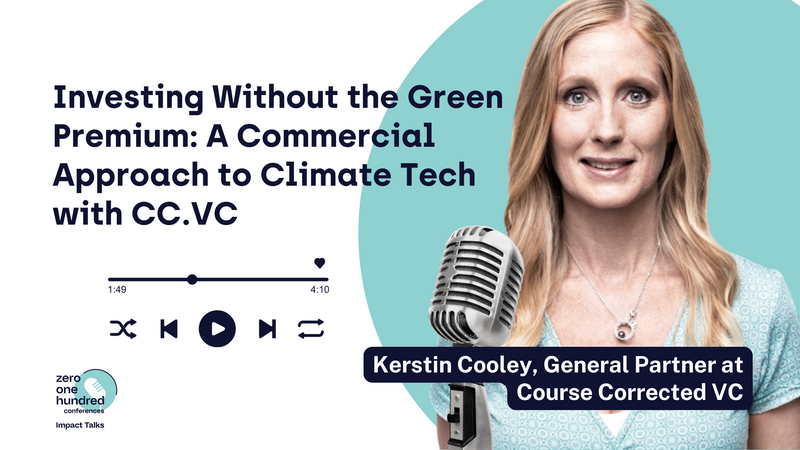In this episode of 0100 Impact Talks, we sit down with Kerstin Cooley, a pioneering voice in Nordic venture capital and co-founder of Course Corrected Ventures (CC.VC). With a track record that includes founding Brightly Ventures and Moor, Kerstin brings decades of experience in backing globally unique early-stage tech companies. She also holds a leadership role at SEB Investment Banking and has co-founded ventures across media and financial services. In this wide-ranging conversation, she shares the evolution of her investment thesis—from generalist tech to climate tech—and the critical role of commercial viability, institutional capital, and resilience in building Europe’s next generation of impact-driven startups.

Can you tell us a little more about these companies and their current status?
I spent the first 10 years of my career as an operator. I worked in a Silicon Valley company listed on Nasdaq in 1998 and then in a Swedish financial software firm acquired by Warburg Pincus in 2004.
When I returned to Sweden, I joined SEB’s investment bank in an alternatives team, building hedge fund structures for institutional investors. In 2012, I met my partner Katja, who had sold her company. We shared a view that there was a lack of seed capital in Sweden despite strong tech talent. So we raised our first VC fund, Moor, in 2013, which was quite successful—it returned 4.5x and was only €25M.
What does "Moor" mean?
It was actually the English name of our first seed investor. We thought it was fun—it doesn’t mean anything else!
And from there, you launched Course Corrected VC in 2021?
Exactly. After two generalist tech funds, we felt the market didn’t need another generalist fund—there were already 20–30 seed funds in Sweden. Katja and I parted ways with our previous partners and teamed up with Christine, who shared our climate vision. With support from a major Swedish pension fund, we launched Course Corrected.
What’s the current status of the fund? Are you deploying your second fund?
Yes. We deployed our final ticket from Fund I at the end of 2024. That fund has 16 companies. We’ve closed the first round of Fund II at €65M and are targeting €90M+. We haven’t made our first investment from Fund II yet but are very close.
You mentioned a focus on climate tech. There are many such funds today—how do you differentiate, especially as a commercially driven team?
Our North Star is greenhouse gas (GHG) reduction. We focus on the energy and industrial transformations. We invest in both software and hardware—ideally low CapEx or capital-efficient. The team is crucial—vision, domain expertise, leadership, and resilience are key.
At what stage do you invest?
We invest at early stages—pre-seed, seed, and Series A. Ticket sizes range from €500K to €2.5M.
You mentioned cost-efficiency as a key factor—how do you measure this early on?
It’s tough pre-launch. But we believe customers won’t pay a "green premium" at scale. Products must be better and cheaper. Even if expensive initially, unit economics at scale must work.
Can you share examples from Fund I (without naming names if needed)?
We invest across five themes:
Sustainable food
Energy efficiency & electrification
Industrial processes & new materials
Circularity
Climate accountability & transparency
We’ve invested in everything from electric aircraft to shipping battery systems, screen-printing tech that stores and generates energy, and load-balancing software. One of our companies reached a 10x valuation since 2022. Others are still early in their journeys.
Let’s talk about dual-use and defense—can your portfolio play in that space?
It’s a bit of a buzzword, but yes, some companies have dual-use potential, like electrification of shipping. Most of our innovations help strengthen industry and infrastructure, which contributes to resilience—an important dimension of national and European defense. However, we aren’t focused on military applications.
Europe is often labeled as bureaucratic—how do you see the environment for startups and VC here?
Europe is complex, yes, but also incredibly innovative. Policy won’t lead the change—entrepreneurs will. Governments and institutions are trying, and we need to keep connecting them to real-world startup needs. The climate tech journey especially will be led by innovators, not incumbents or regulators.
You’ve raised capital from institutional LPs, which can be hard for new managers. Any advice for emerging GPs?
Fundraising from institutions is a long game. You need time, patience, and consistent engagement. We’ve had institutional support since Fund I. LPs often wait until Fund III to commit, so building track records and trust is key. Share insights, hold portfolio days, and stay in touch.
Where are you investing geographically?
In Fund I, 65% of our deals were in the Nordics, with others in the UK, Germany, the Netherlands, and the US. Fund II will be Europe-only (EIF is an LP). Our base is Stockholm, so we’re strongest in the Nordics, but we are actively building relationships across Europe.
Looking ahead, what trends will shape climate tech over the next 5–10 years?
So much is happening:
Clean energy (solar, wind, hydro) and energy storage
Nuclear innovation, including fusion
Electrification of transport (including heavy transport and aviation)
Carbon capture and utilization
Circular economy and waste-to-energy
Electrification of the built environment (heating/cooling)
We’re incredibly optimistic—Europe has what it takes to lead the way.

